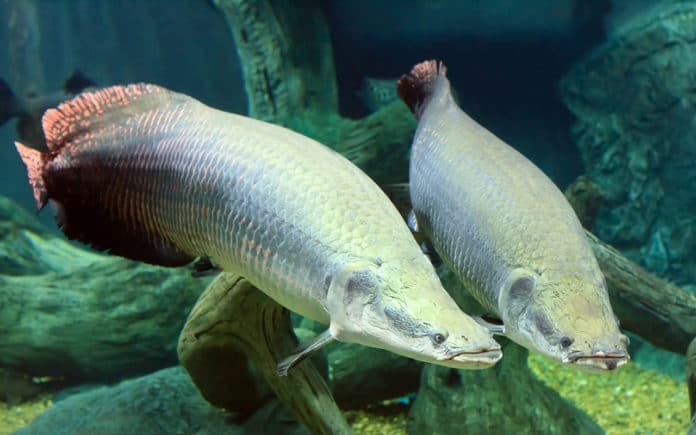Fish scales are highly efficient natural dermal armors that protect fish from predators without impeding their flexibility. Thus, mimicking their design in engineering materials can lead to improved lightweight armor materials.
The scale of the Arapaima Gigas is a superb example of this, enabling its survival in piranha-infested lakes of the Amazon.
What is the secret to the fish’s impermeable armor?
Scientists at the University of California San Diego have now discovered that the scale is made up of a highly mineralized outer layer. This layer resists infiltration and a soft yet tough internal layer of collagen that deforms and absorbs pressure, preventing damage from spreading.
Arapaima fishes are usually 10 feet (3 meters) long and weigh up to 440 pounds (200 kg). It can breathe air and survive up to a day outside of the water.
Arapaima’s scales are made up of internal layers of flexible webbing sandwiched between outer layers of hard plastic. In any case, man-made materials, for example, are bound utilizing a third adhesive material, while the fish’s scales are bound by collagen on an atomic level; they develop together, weaving into one solid piece.
Unlike any other fish species, the collagen layers in Arapaima scales are as thick as a grain of rice. According to scientists, this thickness is the key to the scales’ toughness.
Scientists conducted laboratory tests of the scales. They tested this by making cracks in Arapaima scales and absorbing them in water for 48 hours, then gradually pulling the edges apart while applying force through a special fixture. As they increased the power, they saw that piece of the mineralized, hard outer layer expanded, cracked, and afterward gradually peeled off. The scales localized the crack, containing it and preventing damage from spreading in the twisting structural collagen layer. If the applied pressure broke through the scale, it deformed the scale rather than breaking it.
Movie showing the various plastic deformation mechanisms that retard crack propagation in moist Arapaima fish scales:
Researchers are now investigating how Arapaima’s scales have adapted to prevent penetration from piranha bites as well as how nature behaves this way in other species.
